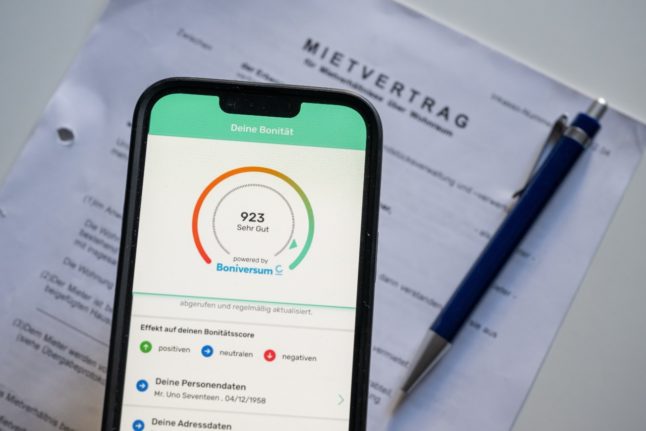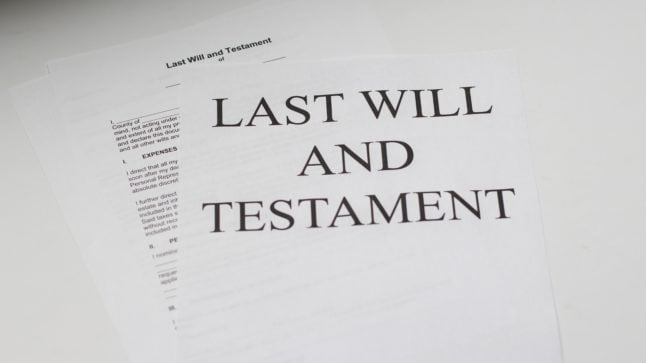Anyone who’s looked for an apartment, sought a new utilities or phone contract or tried to get a loan in Germany will be aware of what the Schufa is. The credit bureau looks at your financial history, gathers the information it has and gives you a score that determines how likely you are to be approved – or denied – credit.
This type of information is generally submitted to companies automatically when they conduct a credit check, but you can also apply to get a full credit report sent to you by post or digitally.
Until recently, though, getting quick access to a credit score via Schufa has involved signing up for a special subscription that currently costs around €4 per month. Without that, you generally have to apply for the credit report via the website – and you’re only entitled to one free one per year.
However, after Schufa acquired credit-score app Bonify as a subsidiary at the end of 2022, it has been working on making an official credit check and credit alerts available via the app. Now the instant Schufa credit score feature has been launched, it’s likely that far more people in Germany will soon be reaching for their smartphones to keep an eye on their credit in real-time.
READ ALSO: Schufa: How foreigners can improve their German credit score
What is Bonify and how does it work?
Bonify is a free app that offers a credit check and financial management service. At present, users can get a score that’s set by private credit check agency Boniversum to get a sense of how credit-worthy they are, and can also link their existing bank accounts to get an overview of their income, savings and outgoings each month.
Though the app is free, Bonify appears to monitise it by upselling various contracts or credit deals to its users based on their data. For example, people might get an offer for a Santander credit card that has been “pre-approved” for them using their credit info. Currently, the app has around 1.1 million users.
Since Schufa acquired the app at the end of last year, plans have been underway to link Bonify more closely to the official credit rating and credit core system. Now, users can use the app to get a real-time view of their Schufa credit score on their smartphone, and in future they will also get notifications from Schufa if something happens that could harm their credit.
In 2024, a new Schufa score simulation feature is set to be launched on the app: with this, users can play around with potential financial scenarios to see what impact a certain loan or credit decision could have on their score.
How does the sign-up process work?
People who want to use Bonify need to register for an account using their personal ID card or residence permit. Alternatively, they can use their bank account as identification – though doing things this way automatically grants Bonify 90 days of access to your financial data, unless you remove the account immediately after signing up.

In future, Schufa say they want to add more options for verifying your identity, such as the electronic ID function on ID cards and residence permits. They also want to offer users a way to use their bank account solely for identification – without allowing access to the information on the account.
Why are consumer rights groups concerned about Bonify?
With the third-party company now absorbed into Schufa, it seems likely that the app will have a much wider take-up than it previous has – particularly if it offers a quick and free way for them to check their official credit score.
But consumer groups like the Consumer Rights Centre (VBZ) are urging users to be cautious when it comes to the amount of data they share.
“It is not a problem to use the app to obtain a free Schufa report,” VBZ’s Dorothea Mohn told RND. “However, I would not recommend that anyone agrees to the bank account access.”
READ ALSO: Schufa explained: How to avoid the ‘catch 22’ in Germany’s credit rating system
Though giving Bonify access to your bank account is technically voluntarily, Mohn worries that people will feel pressured into doing so if they believe it increases their chances of obtaining credit.
This could give Schufa a chance to gather even more data on individuals based on their account details and transactions.
However, the credit agency itself insists that consumers have nothing to fear in making their data more readily available. “More information leads to fairer and for most people better scores,” its website declares.
How much information does Schufa have on me – and will this change?
At the moment, Schufa is able to see how many credit cards and bank accounts you have, and also collects reports from companies on any missed payments or defaults, for example.
What they don’t currently have access to is more granular information about your financial habits – like how much money you actually have in your accounts and what you spend it on.
In light of criticism from consumer protection groups, Schufa has emphasised that Bonify remains a separate company and that information shared via the Bonify app won’t be shared with Schufa unless users explicitly agree to this.
They also say that very little information about your spending habits will be relevant to your credit score.
If the credit agency uses any account info at all, it will be to assess how much income you have, Schufa boss Tanja Birkholz told Die Zeit. “Whether someone donates money to Greenpeace or is committed to a party is irrelevant for the credit rating,” she added.




 Please whitelist us to continue reading.
Please whitelist us to continue reading.
Member comments